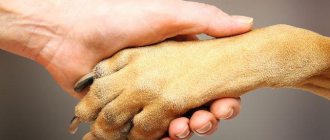Sometimes owners, pampering their pet with some human product, do not even realize that they can seriously harm it.
From this article you will find out: is it possible to give dogs the nuts that humans so often consume?
We will analyze all the popular types of nuts, find out how dangerous each of them is, to whom this product is contraindicated, and what needs to be done if your pet is poisoned or the nut gets stuck in the throat.
It also happens that some human food products will be very useful for dogs and will strengthen the dog’s immunity and health. Let's look at the question in detail: do nuts help improve health more or, on the contrary, cause irreparable harm to the body?
Possible or not - recommendations from veterinarians
Many dog breeders disagree on whether it is possible or not to give dogs such a high-calorie product as nuts. Some argue that a small amount of nuts will benefit a young growing body. Others are inclined to believe that nuts cause an allergic reaction and contribute to pet obesity.
On a note! 100 g of nuts contain from 550 to 900 kcal. For an animal, this dose is very high in calories.
Be that as it may, veterinarians advise following simple rules so as not to harm your pet:
- Give only fresh nuts in their raw form, without adding salt, sugar, flavoring, chocolate or icing.
- Give your dog only one type of nut to try on one day, and monitor his well-being for 2-3 days. Then increase the portion and again observe the behavior and health of the pet. Only after this can you try giving a different type of nut.
- The weight of the first portion should not exceed 10 g or 1-2 large nuts.
- There should be no traces of mold or rot on the fruits. This will cause disruption in the gastrointestinal tract.
The table clearly shows which nuts dogs can eat and which ones are strictly prohibited for them to eat:
| Can | It is forbidden |
| Cedar | Walnut |
| Almond | Pistachios |
| Chestnut | Hazelnut |
| Brazilian nut | Nutmeg |
| Cashew | Macadamia |
| Peanut | Pecan |
| Coconut | Acorns |
Now let’s take a closer look at why you can or cannot give certain fruits to your pet.
Before offering peanuts to your dog
Although dogs can eat peanuts, it is important that we know how to introduce them to your diet . It is important to ensure that the product is safe and beneficial for your dog. Part of the problem is that peanuts come in different varieties and even shapes. Some are in the shell, some are fried, others are salty or sweet. While many dogs are happy to eat them in the shell, it can cause gastrointestinal and oral discomfort...
Ideally, you should feed your dog raw peanuts as they retain most of the nutrients. You can give your dog oven-roasted peanuts, as long as they don't contain salt, sugar, or other flavorings or preservatives . Roasted and caramelized peanuts should be avoided under all circumstances. Sugar is also very bad for dogs at risk of developing diabetes...
Can dogs suffer from peanut allergies?
You also need to make sure your dog has been examined by a veterinarian. This is necessary to ensure your overall health, but we will need to check for allergies. While it's difficult to understand the cause of peanut allergies in dogs (as many dogs won't even get them tested), we do know that they can suffer from peanut allergies . In fact, research has shown that a dog can experience human-like reactions when allergic to peanuts...[one]. This is so high that it has been proposed to use dogs in allergy trials...
What nuts can dogs eat?
The benefits of nuts for dogs lie in their composition. They are rich in useful substances such as:
- vitamins A, C, D, group B, PP, K;
- macro- and microelements that ensure normal functioning of the body;
- amino acids and vegetable protein.
Cedar
Pine nuts are easily digested by the dog's body. They contain many useful substances such as calcium, iron, copper, iodine. And they do not contain toxins that are harmful to your pet. A small amount of fruit stimulates the functioning of the hormonal and cardiovascular systems and improves the appearance of the coat. After consumption, your pet will not have a feeling of heaviness in the stomach.
According to hunters, their dogs love to chew pine nuts. Cedar fruits are useful for dogs during illness or during the recovery period.
Almond
Dogs are allowed to eat almonds only in small doses. Frequent feeding of this type of fruit is not recommended; 20-30 g per week is sufficient. The composition contains many B vitamins, which improve the appearance of the coat and strengthen the bones. Can be given in crushed or ground form, added to porridge, cottage cheese.
Almonds contain large amounts of monounsaturated fats, which affect liver function. Frequent feeding will lead to pancreatitis in your dog. Bitter almonds are more suitable for spices, but they pose a threat to the animal's life because they contain cyanide.
On a note! You can give your animal almond milk without preservatives or additives. Almond oil is prohibited.
Coconut
Coconuts by themselves are not of interest to dogs. But their contents – coconut milk – are very healthy. In large quantities, coconut milk, pulp or oil can cause diarrhea in your pet. Therefore, watch how much your dog eats them.
The permissible dosage for a dog is 1 teaspoon per 4.5 kg of body weight. You can give coconut milk once a day, adding it to the menu.
Chestnut
Chestnuts eaten by humans (we are not talking about horse chestnuts) can also be eaten by dogs. The fruit is not toxic, but very fatty and high in calories. In large quantities it causes diarrhea and disrupts the functioning of the pancreas. Give to the dog no more than once a month.
On a note! Horse chestnut should not be given to a dog!
Brazilian nut
The acceptable limit for dogs is 1 Brazil nut per day and once a week. Such a restriction is necessary so as not to provoke loose stools in the animal. The nut contains selenium, which is necessary to maintain the functioning of the thyroid gland and strengthen the immune system.
Brazil nuts are recommended for large breed dogs such as Labrador, Shepherd, St. Bernard, Diver and others.
Cashew
The benefits of cashews are rich in calcium and magnesium. These minerals have a beneficial effect on the circulatory system, support heart function, and strengthen blood vessels and bones. The fat content of nuts is slightly lower than that of other types.
You can give your dog a few nuts after his main meal or as a treat. For small breeds, for example, Spitz, Chihuahua, it is better to grind cashews through a meat grinder so that the dog does not choke.
Peanut
Peanuts belong to the legume family. But despite this, it is the safest of all types of nuts. Not only do dogs love nuts, but they also love salt-free peanut butter, which you can make at home. The benefit of peanuts is the presence of a large amount of vegetable protein. It affects the nervous system, normalizes the functioning of the endocrine system, and has a choleretic effect.
The only danger is that in large quantities it can cause an allergic reaction. Therefore, dogs prone to food allergies should be given peanuts carefully, in small portions. These fruits are also not recommended for animals with kidney and gall pathologies.
On a note! Peanuts are better digestible and do not cause harm if they are not fried, without salt and sugar.
General rules for feeding hamsters nuts
You should follow the recommendations for proper treats for your pets to keep them healthy, alert, and feeling well.
General rules:
- treat nuts no more than 3 times a week (adult);
- alternate types of treats;
- give raw nuts.
It is unacceptable to feed your hamster processed foods, salted, glazed, or with added food additives.
How to properly give nuts to a hamster?
The stomach of rodents is not able to digest solid residues, so the nuts must be peeled and peeled. Hamsters cannot chew hard shells, such as those from walnuts.
Possible problems when feeding nuts
Salted nuts irritate the mucous membrane of the digestive tract and impair kidney function. Poorly cleaned foods clog the cheek pouches, get stuck, and can damage the digestive organs.
What nuts should dogs not eat?
We have listed above which nuts can be given to dogs; all other types are prohibited. This is due to the high calorie content of the product, increased fat content and the side effects that they cause in the pet’s body.
Walnuts
A walnut familiar to humans will cause poisoning in a dog if it eats even a small piece. The fetus affects the central nervous system of the animal, making it excited and aggressive. Small mold inside the kernel can cause vomiting, diarrhea and nausea, and disrupt the gastrointestinal tract.
The fruits are poorly digestible in the animal’s stomach and often cause indigestion. Phosphorus in walnuts can trigger the development of urolithiasis. The mold on the surface of the fruit contains cyanide, which will cause convulsions, body tremors, and loss of consciousness.
Important! If a dog picks up a nut in a shell on the street and eats it, it can cause constipation and intestinal obstruction. The dog will need the help of a veterinarian.
Hazelnut
If you give a dog hazelnuts once, there will be no noticeable harm to it. However, systematic consumption of fruits can provoke the formation of stones in the genitourinary system.
An excess of the microelement iron in the composition, accumulating in the animal’s body, causes the occurrence of a disease of the genitourinary system - urolithiasis.
Macadamia
This is one of the most dangerous nuts for dogs. Along with nutmeg, eating even a small portion of macadamia can cause severe poisoning in an animal.
First symptoms:
- nausea;
- gag reflex and vomiting;
- impaired gait;
- feverish condition.
Then comes paralysis of the limbs, rapid heartbeat, and convulsions. If help is not provided in a timely manner, the dog will die.
Important! The lethal dose for a dog is from 0.7 g per 1 kg of body weight.
Pistachios
Excessive amounts of fat in pistachios will cause bloating and diarrhea in your dog. The mold fungi that often cover the fruits of the pistachio tree are invisible to the human eye. They are the ones that have a toxic effect on the animal’s body.
Important! The human body weight often exceeds that of a dog, so the ratio of fungi to human weight is not a threatening factor. A person can eat such nuts without harm to his health.
Muscat
Nutmeg is intended for cooking. A small piece or powder of nutmeg will provoke a cramp in the animal. Overdose can cause paralysis or death.
Nutmeg contains aflatoxins, which gradually destroy liver cells in dogs. They can cause severe toxic hepatitis, neurological disorders, paralysis, and convulsions.
Pecan
Some veterinarians allow pecans for dogs. However, the permissible dosage is so small, and the threat to the pet’s life is too great, that there is no point in taking risks. The daily allowance for an adult large breed dog is 1 nut and no more.
The fetus causes general malaise and disrupts the functioning of the central nervous system. In large quantities it leads to the death of the animal.
Acorns
An acorn is also a nut. They contain gallotannin. It causes severe poisoning and disrupts kidney function. The owner must strictly ensure that the pet does not eat not only acorns, but also oak leaves and bark.
Important! Do not let your animal drink from a puddle containing oak leaves. Large amounts of gallotannin enter the water through fallen leaves.
Controversial and questionable nuts
Hazelnut - a controversial nut
It is sometimes recommended to be given for mild diseases of the cardiovascular system. The product is believed to cleanse the liver, remove toxins from the body and help strengthen the immune system. Portions should be strictly limited, since in large quantities hazelnuts can provoke the development of urolithiasis.
Another questionable nut is the walnut.
It contains a lot of vitamins and minerals, but even a large dog should be fed no more than 2 pieces at a time. Don't let your pet pick up treats from the ground! Ingestion along with the shell is fraught with obstruction. Nuts with mold are especially dangerous: they can cause poisoning.
How to give and how much
Following simple recommendations on how to give nuts and monitoring your pet’s well-being will help you provide him with timely help or prevent an overdose.
Adviсe:
- Do not use nuts as reward treats for your pet. Thus, it is difficult to control the amount of fruit eaten, which will lead to an overdose. In addition, the fruit can get stuck in the throat or digestive tract, causing suffocation.
- Do not give nuts to dogs with allergies during periods of exacerbation or treatment. This may cause additional health complications.
- Eating a large amount of the product will lead to obesity. Therefore, they are not recommended for breeds prone to this phenomenon or those leading a sedentary lifestyle.
- Grind large fruits using a meat grinder or grater so that the animal does not accidentally choke when swallowing the nut.
- Pre-clean the fruits from the shell, make sure that there is no mold or rot. Do not give your dog stale nuts that are long past their expiration date.
How many nuts can you give your dog?
- pine nuts – 1-2 nuts per day;
- almonds – 2-5 pcs. in one go;
- cashews – a small handful, 1-2 times a week;
- Brazil nut – 1 pc. nucleolus twice a week.
From what age
Puppies can start giving nuts when they are 6 months old. They can eat cedar fruits, peanuts, and cashews. These are the safest types for a young body. Introduce into the diet gradually, in small portions of 1-2 pieces.
To prevent a small pet from choking, the nuts are first crushed and added to the main menu, porridge, and cottage cheese.
Who are nuts contraindicated for?
What cereals can be given to dogs: is it possible to give porridge?
Some pets should not be given nuts:
- Puppies under 5 months of age due to the immaturity of the digestive system.
- Pregnant females, to avoid additional stress on the body.
- Dogs prone to allergic reactions.
- Sick animals. A weakened immune system needs to be supported, but heavy food will only complicate its work.
- Dogs with kidney, stomach, and intestinal diseases.
Females nursing offspring are given cashews or pine nuts with caution. They are allowed to be used to enhance lactation.
Contraindications and side effects
The consumption of nuts is strictly contraindicated for old dogs after 10 years of age, pregnant females and nursing puppies. It is also prohibited for those individuals who have a tendency to food allergies, or have kidney or liver pathologies.
Side effects that may occur from use:
- nausea, vomiting, diarrhea;
- dizziness, disruption of the central nervous system;
- disruption of the genitourinary system, pancreas, kidneys and liver.
What to do if your dog is poisoned by nuts
If your pet ate the forbidden fruit and became ill, contact a veterinary clinic immediately. Before providing first aid, give him activated carbon at the rate of 1 tablet per 1 kg of body weight. Try to induce vomiting in the dog so that as much as possible of the prohibited product comes out of the body.
As you can see, you can give nuts to dogs, but not all types and only in limited quantities. Nuts benefit the dog and saturate its body with vitamins and minerals. By observing the correct dosage, you can avoid poisoning and complications with her health.
More about groundnuts
When wondering whether dogs can eat peanuts, it’s worth taking a closer look at the product.
Peanuts - also called groundnuts - are an important crop in agriculture, cultivated for their fruits (“nuts”). In botany, peanuts are a leguminous herb and not a nut at all. And the name “groundnut” is a tracing-paper from a foreign language.
Overall this is a very useful product. Of course, you should consume it within reasonable limits and only in its raw form. Why can't dogs have roasted peanuts? This question will be answered a little later.
Peanuts are not as fatty as other nuts because they are not a nut at all. It contains nutritional elements: vegetable protein, sodium, potassium, iron, phosphorus, zinc, vitamins A, B, E, K, folic acid, amino acids. Consumption of peanuts has a beneficial effect on the cardiovascular, endocrine system, and liver.
But it is a difficult-to-digest product, so you should not give it to your pet in large quantities. After it, bloating and increased gas formation are possible. If a dog is diagnosed with kidney or liver failure, the answer to the question of whether a dog can eat peanuts will be a resounding negative.










